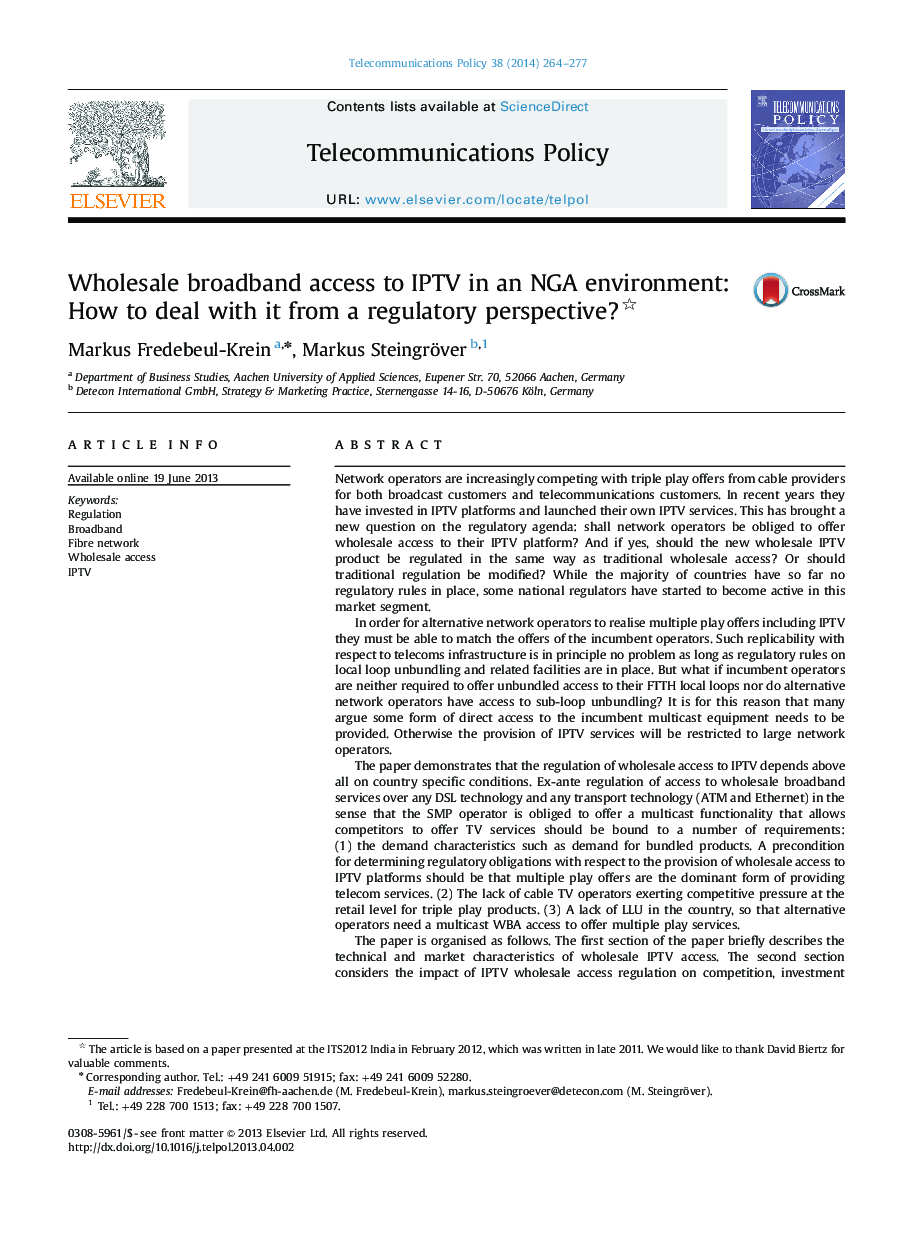| کد مقاله | کد نشریه | سال انتشار | مقاله انگلیسی | نسخه تمام متن |
|---|---|---|---|---|
| 559722 | 875099 | 2014 | 14 صفحه PDF | دانلود رایگان |

• Regulation of wholesale access to IPTV depends on country specific conditions.
• Extent of competition in the triple play market determines type of wholesale access regulation.
• Level of price (or any) regulation should be inversely related to the degree of competition.
• Regulators may switch from an ex-ante price regime based on cost-orientation to an ex-post price regime.
• Regulators may define remedies whereas compliance with these remedies would be controlled ex-post.
Network operators are increasingly competing with triple play offers from cable providers for both broadcast customers and telecommunications customers. In recent years they have invested in IPTV platforms and launched their own IPTV services. This has brought a new question on the regulatory agenda: shall network operators be obliged to offer wholesale access to their IPTV platform? And if yes, should the new wholesale IPTV product be regulated in the same way as traditional wholesale access? Or should traditional regulation be modified? While the majority of countries have so far no regulatory rules in place, some national regulators have started to become active in this market segment.In order for alternative network operators to realise multiple play offers including IPTV they must be able to match the offers of the incumbent operators. Such replicability with respect to telecoms infrastructure is in principle no problem as long as regulatory rules on local loop unbundling and related facilities are in place. But what if incumbent operators are neither required to offer unbundled access to their FTTH local loops nor do alternative network operators have access to sub-loop unbundling? It is for this reason that many argue some form of direct access to the incumbent multicast equipment needs to be provided. Otherwise the provision of IPTV services will be restricted to large network operators.The paper demonstrates that the regulation of wholesale access to IPTV depends above all on country specific conditions. Ex-ante regulation of access to wholesale broadband services over any DSL technology and any transport technology (ATM and Ethernet) in the sense that the SMP operator is obliged to offer a multicast functionality that allows competitors to offer TV services should be bound to a number of requirements: (1) the demand characteristics such as demand for bundled products. A precondition for determining regulatory obligations with respect to the provision of wholesale access to IPTV platforms should be that multiple play offers are the dominant form of providing telecom services. (2) The lack of cable TV operators exerting competitive pressure at the retail level for triple play products. (3) A lack of LLU in the country, so that alternative operators need a multicast WBA access to offer multiple play services.The paper is organised as follows. The first section of the paper briefly describes the technical and market characteristics of wholesale IPTV access. The second section considers the impact of IPTV wholesale access regulation on competition, investment and broadband diffusion. The third section examines regulatory issues concerning access to wholesale IPTV in more detail. The final section gives key recommendations for a regulatory strategy on wholesale broadband access to IPTV.
Journal: Telecommunications Policy - Volume 38, Issue 3, April 2014, Pages 264–277